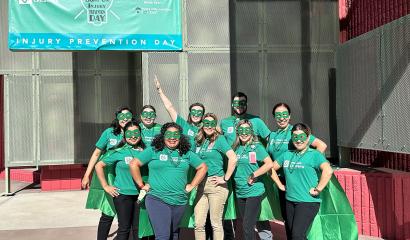Bright Futures
Articles and Updates from Phoenix Children's
Dogs make wonderful additions to any household. They make you laugh, teach children responsibility and most importantly, give your family unconditional love.
When my son turned six, we brought home Leo. Soon after, Sam, Eddie and Phoebe joined in on the fun. Within the blink of an eye, we had four dogs in our home. It has been a joy watching my son care for and play with his dogs.
If you are considering adding a new dog for your household, keep in mind that every dog breed is different. From their behaviors to their traits and temperament, different dogs are best suited for different families. I recommend researching breeds to make sure your family is able to meet their needs.
Whether you already own a dog or are thinking of getting a dog, it is very important to talk to children about dog safety. Remember, all dogs can bite! Always remind kids to:
- Pet and hold a dog gently, especially around the shoulders or chest. Tell your child to be gentle and calm around dogs so as not to scare them. If your child is playing rough, dogs may also react similarly.
- Avoid petting a dog’s head, face, ears or tail. Tell children to pet in the direction that the hair is growing so as not to upset the dog.
- Never pet dogs while they are chewing on a toy, eating or sleeping. Dogs can become possessive over their food and toys. Even friendly and playful dogs can show signs of aggression if bothered while eating or playing with a new toy. It is best if children keep their distance when dogs have something in their mouths to avoid accidental injury.
Other recommendations include:
- Spaying or neutering your dog. When you spay or neuter your dog, you reduce aggressive and dominant behaviors making them less likely to bite.
- Training and socializing your dog is very important. By creating positive experiences with other dogs, adults, and children, your dog will feel comfortable in different situations. Offer a treat and praise them to encourage positive behavior.
Dog’s teeth are thin and sharp, wounds may be deeper than they appear. If a dog bites your child, wash the wound with soap and warm water and apply pressure to the wound. To prevent infection, follow up with your provider for additional recommendations on wound care. If a wound is severe, seek immediate care or call 911.
As my son continues to create a special bond with Leo, Sam, Eddie and Phoebe, I continue to remind him of the importance of safe dog handling. The American Veterinary Medical Association (AVMA) reports that dogs bite more than 4.5 million people each year in the United States. Unfortunately, children who get bitten can suffer severe injuries. Please remember that an adult should always be present when children and dogs are playing together. No matter the dog’s size, breed or age never leave children unattended. Follow vaccine recommendations to keep your dog healthy and your family and friends safe from life treating diseases.
To learn more about dog bite prevention, watch the video here or contact Ilce Alexander, senior injury prevention specialist at Phoenix Children’s, by calling 602-933-3393.




